Creating Capacity for Attachment

Edited by
Arthur Becker-Weidman, Ph.D.
Deborah Shell, MA, LCMHC
This book, Creating Capacity for Attachment is for professionals, parents, and anyone who works or lives with children who have trauma-attachment disorders. This comprehensive text describes the theory and practice of Dyadic Developmental Psychotherapy. Dyadic Developmental Psychotherapy is an evidence-based approach, with demonstrated effectiveness, for treating adopted and foster children and those with trauma-attachment disorders, such as Reactive Attachment Disorder.
The Chapters were written by various contributors from around the country who practice Dyadic Developmental Psychotherapy. Arthur Becker-Weidman, Ph.D. has written the Introduction, the Chapter on Theory, and, in conjunction with the three families, the chapter on Parent's experience with Dyadic Developmental Psychotherapy.
Respected professionals offer practical strategies for treating and parenting children with trauma and attachment disorders.
More information...
The Chapters were written by various contributors from around the country who practice Dyadic Developmental Psychotherapy. Arthur Becker-Weidman, Ph.D. has written the Introduction, the Chapter on Theory, and, in conjunction with the three families, the chapter on Parent's experience with Dyadic Developmental Psychotherapy.
Respected professionals offer practical strategies for treating and parenting children with trauma and attachment disorders.
More information...
Attachment Parenting
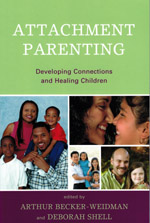
Edited by
Arthur Becker-Weidman, Ph.D.
Deborah Shell, MA, LCMHC
This book, Attachment Parenting describes a comprehensive approach to parenting children who have a history of neglect, abuse, orphanage care, or other experiences that may interfere with the normal development of attachment between parent and child. Grounded in attachment theory, Attachment Parenting gives parents, therapists, educators, and child-welfare and residential-treatment professionals the tools and skills necessary to help these children.
With an approach rooted in Dyadic Developmental Psychotherapy, which is an evidence based, effective, and empirically validated treatment for complex trauma and disorders of attachment, Arthur Becker-Weidman, Ph.D. and Deborah Shell, MA, LCMHC provide practical and immediately usable approaches and methods to help children develop a healthier and more secure attachment.
More Information...
With an approach rooted in Dyadic Developmental Psychotherapy, which is an evidence based, effective, and empirically validated treatment for complex trauma and disorders of attachment, Arthur Becker-Weidman, Ph.D. and Deborah Shell, MA, LCMHC provide practical and immediately usable approaches and methods to help children develop a healthier and more secure attachment.
More Information...
Principles of Attachment Parenting
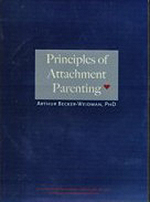
Arthur Becker-Weidman, Ph.D.
This DVD is for both parents and professionals. It describes the basic principles of attachment-facilitating parenting and specific approaches, methods, and techniques. The DVD describes basic principles and the majority of the DVD focuses on practical applications to help develop a more healthy, secure, and engaged attachment-relationship between the primary caregiver(s) and the child.
Attachment Facilitating Parenting - DVDs

Arthur Becker-Weidman, Ph.D.
This 3 DVD set is a workshop for parents and professionals about effective methods to develop a more secure and healthy attachment with children who have a history of trauma attachment problems.
The set includes video clips of parents and children as well as demonstration of effective parenting methods.
The set includes video clips of parents and children as well as demonstration of effective parenting methods.
Attachment Facilitating Parenting - VHS

Arthur Becker-Weidman, Ph.D.
This 3 VHS set is a workshop for parents and professionals about effective methods to develop a more secure and healthy attachment with children who have a history of trauma attachment problems.
The set includes video clips of parents and children as well as demonstration of effective parenting methods.
The set includes video clips of parents and children as well as demonstration of effective parenting methods.
The Dyadic Developmental Psychotherapy Primer
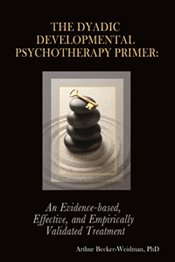
Arthur Becker-Weidman, Ph.D.
This Primer will provide the reader with an overview of the practice of Dyadic Developmental Psychotherapy. Within these pages you will find a succinct summary of the principles, components, and phases of this evidence-based and effective approach to treatment. It is important to recognize that in the approach, relationship is the central and guiding principle.
This book will be useful in classes about family therapy, counseling, and treatment methods and can be a useful adjunct to graduate course curricula. Child Welfare professionals, judges, and attorneys will find this book useful as a description of this treatment model, and it may be used to ensure that appropriate treatment is provided. By explicating the primary principles, components, and phases of treatment, this book will help ensure continued integrity to this model of treatment as taught at the Center For Family Development and at other training institutes.
More Information...
This book will be useful in classes about family therapy, counseling, and treatment methods and can be a useful adjunct to graduate course curricula. Child Welfare professionals, judges, and attorneys will find this book useful as a description of this treatment model, and it may be used to ensure that appropriate treatment is provided. By explicating the primary principles, components, and phases of treatment, this book will help ensure continued integrity to this model of treatment as taught at the Center For Family Development and at other training institutes.
More Information...
Assessing Caregiver Reflective Capacity, Commitment, Insightfulness and Sensitivity
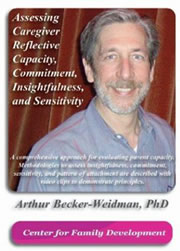
Arthur Becker-Weidman, Ph.D.
This two-DVD set contains over three hours of material describing how to assess parent capacity, which will be useful for those working with adoptive and foster parents. The DVD describes: factors associated with placement stability, specific methodologies to assess commitment, and parent state of mind with respect to attachment insightfulness and sensitivity.
The DVD contains video clips of actual evaluation sessions to demonstrate the principles. Psychologists, social workers, mental health professionals, child welfare workers, and others who work with children in the child welfare system will find this DVD of value.
The DVD contains video clips of actual evaluation sessions to demonstrate the principles. Psychologists, social workers, mental health professionals, child welfare workers, and others who work with children in the child welfare system will find this DVD of value.
Assessing Children with Complex Trauma and Attachment Disorders
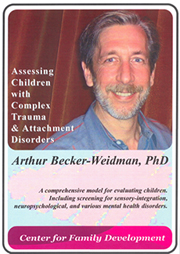
Arthur Becker-Weidman, Ph.D.
This two-DVD set (approximately three hours) explains how to assess children for Complex Trauma and disorders of attachment.
There is a large body of literature describing the effects of early maltreatment on later child development, behavior, and functioning. Children reared in orphanages show a significant cognitive delay of eight IQ points when compared with similar children who are placed in foster care or raised with their biological parents. “These results point to the negative sequelae of early institutionalization,” (Nelson, Zeanah, Fox, Marshall, Smyke, and Guthrie, 2007, p. 1937). Children with histories of maltreatment, such as physical and psychological neglect, physical abuse, or sexual abuse, are at risk of developing severe psychiatric problems (Gauthier, Stollak, Messe, and Arnoff, 1996; Malinosky-Rummell and Hansen, 1993). These children are likely to develop Reactive Attachment Disorder (Lyons-Ruth and Jacobvitz, 1999; Greenberg, 1999) and may be described as experiencing Complex Trauma. When the trauma experienced is caused by the abuse or neglect inflicted by a primary caregiver, the normal development of secure attachment is disrupted. Such children are at risk of developing a disorganized attachment (Lyons-Ruth and Jacobvitz 1999; Solomon and George, 1999; Main and Hesse, 1990). Disorganized attachment is associated with a number of developmental problems including dissociative symptoms (Carlson, 1988), depression, anxiety, and acting-out symptoms (Lyons-Ruth, 1996, Lyons-Ruth, Alpern, and Pepacholi, 1993).
More Information...
There is a large body of literature describing the effects of early maltreatment on later child development, behavior, and functioning. Children reared in orphanages show a significant cognitive delay of eight IQ points when compared with similar children who are placed in foster care or raised with their biological parents. “These results point to the negative sequelae of early institutionalization,” (Nelson, Zeanah, Fox, Marshall, Smyke, and Guthrie, 2007, p. 1937). Children with histories of maltreatment, such as physical and psychological neglect, physical abuse, or sexual abuse, are at risk of developing severe psychiatric problems (Gauthier, Stollak, Messe, and Arnoff, 1996; Malinosky-Rummell and Hansen, 1993). These children are likely to develop Reactive Attachment Disorder (Lyons-Ruth and Jacobvitz, 1999; Greenberg, 1999) and may be described as experiencing Complex Trauma. When the trauma experienced is caused by the abuse or neglect inflicted by a primary caregiver, the normal development of secure attachment is disrupted. Such children are at risk of developing a disorganized attachment (Lyons-Ruth and Jacobvitz 1999; Solomon and George, 1999; Main and Hesse, 1990). Disorganized attachment is associated with a number of developmental problems including dissociative symptoms (Carlson, 1988), depression, anxiety, and acting-out symptoms (Lyons-Ruth, 1996, Lyons-Ruth, Alpern, and Pepacholi, 1993).
More Information...
Introduction to Dyadic Developmental Psychotherapy
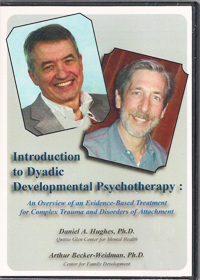
Arthur Becker-Weidman, Ph.D.
Daniel A. Hughes, Ph.D.
This DVD, Introduction to Dyadic Developmental Psychotherapy: An Overview of an Evidence-Based Treatment for Complex Trauma and Disorders of Attachment is presented by trainers certified to offer training by the Dyadic Developmental Psychotherapy Institute.
The DVD begins with an overview of Dyadic Developmental Psychotherapy, its core principles, phases of treatment, and core components of treatment. The last two DVD's in the set present actual video of treatment sessions to demonstrate the principles of treatment. Included are a psychodramatic re-enactment, a session with a single foster mother and teen, and other families.
The DVD begins with an overview of Dyadic Developmental Psychotherapy, its core principles, phases of treatment, and core components of treatment. The last two DVD's in the set present actual video of treatment sessions to demonstrate the principles of treatment. Included are a psychodramatic re-enactment, a session with a single foster mother and teen, and other families.
